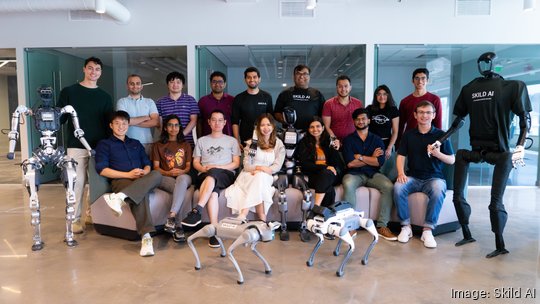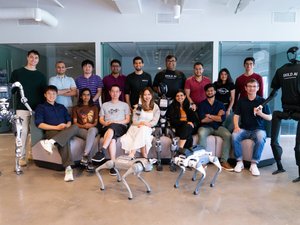
Backed by Jeff Bezos and several notable venture capital firms, Skild AI is building a brain for robots.
The technical term is Artificial General Intelligence, commonly referred to in shorthand as AGI and agreed by experts to be an AI system equally as smart as a human. What experts don't agree on is how, when, or even if this technology can be achieved.
The idea had been researched since the 1950s, but gained prominence at the start of this decade when Silicon Valley-based OpenAI released GPT-3. Since release, OpenAI and many other AI giants have pushed to develop a purely digital form of AGI by training models on data primarily pulled from the internet.
But Skild AI co-founders Deepak Pathak and Abhinav Gupta have a different approach.
In their eyes in order for artificial intelligence to truly match humans, it will, like humans, have to be grounded in the physical world. Several investors clearly agree with, or at least believe in that hypothesis — the company just closed a $300 million Series A round led by Bezos Exhibitions, Lightspeed Venture Partners, SoftBank Group and Coatue, which brought the company's total valuation to approximately $1.5 billion.
"Is there any evidence that you can just read Wikipedia, Reddit, YouTube and become super intelligent?" Pathak, Skild's CEO, said. "It took billions of years for people and grounded intelligence in the real world to evolve, called sensory motor common sense. It took billions of years for life to evolve from basic cells to getting mobility and learning to move... but language and this common sense aspect, like knowing math and cognitive science, is like 10,000 years old, which is nothing compared to billions of years of evolution where you develop physical skills."
For robotics, however, a lack of data has held back the ability to scale AI models.
"For visual [models] you can use Facebook images, Google images and Instagram images to train your vision models, but for robotics there is no such data set that you can download and scale up learning on robotics, and so both Deepak and I were curious of how we could make this work at scale," Gupta, Skild's President, said. "We have been able to break that data barrier in robotics... there is a possibility that we can scale robotics. This has never been possible before and therefore there is a possibility that we can actually learn AGI bottom up the way humans learn intelligence."
One possible use for an AGI powered robot is as a caretaker for elderly individuals, which the two said would be highly beneficial as people are now living longer than before. However, the two noted that it will likely take a long time to reach AGI, and there are other achievements the company expects to make working in the robotics sphere along the way. The team is purely software driven and is currently working with "several hardware vendors" and "several robotics companies" and its model can "be adapted to any proprietary hardware very quickly."
One investor, Stephanie Zhan, has likened Skild's development process to a "GPT-3 moment," referring to how the aforementioned effect GPT-3 had on the publics' perception of AI. But the two said that for robotics, it would be less of a moment and more of a phase.
"Moments have the feeling of being overnight and overnight things can happen in software," Pathak said. "In software, an app can come overnight and you can try it. Robots are physical, they have to be supplied. There is a supply chain and they have to reach different places. Its going to be a phase. At the end, there will be a feeling in the air that robots are coming."
Pathak added that "everybody, even a common person, understands there's something called AI and that it is going to have a big impact on the world" but "nobody thinks of robotics that way." Gupta said that that phase for robotics will be when robots are "deployed for everyday tasks" and that it won't be just one type of robot. For now, the focus is on scaling the models to reach that phase.
"Building AGI is a very expensive endeavor," Pathak said. "[The funding] will mostly be used towards scaling our tools like data for the models and also towards infrastructure and hiring. But the majority of the cost is scaling."
The two, who both are still Carnegie Mellon University professors, albeit on leave, chose Pittsburgh for Skild's headquarters over Silicon Valley, citing Pittsburgh's status as a robotics hub. The firm also has office space in the valley.
"It is very clear that the first boom of AI came from [large language models] and the next boom of AI will come from physical AI, robotics and so on and undoubtedly CMU has one of the best robotics research programs," Gupta said. "In [the LLM boom], Pittsburgh was not participating like, say Silicon Valley, but here I think there's also a possibility that Pittsburgh can also take a lead for the first time as the physical AI boom comes. I mean, it's going to come, it's only a matter of time before everyone is going to be doing everything physically because we do need robots for automation."
A hyper intelligent AI system is not without its caveats, and government agencies have expressed interest in regulation. Even OpenAI CEO Sam Altman, one of the AI world's leading figures, has previously publicly called on governments to regulate the technology, calling it a potential "existential threat."
"With AGI and everything, there is always a double use argument, in an ideal world there is a rosy and nice picture but there is also a flip side," Pathak said. "It's not a question of one company or one person deciding and governing this. We have to be aware of the dual use in the long term."









